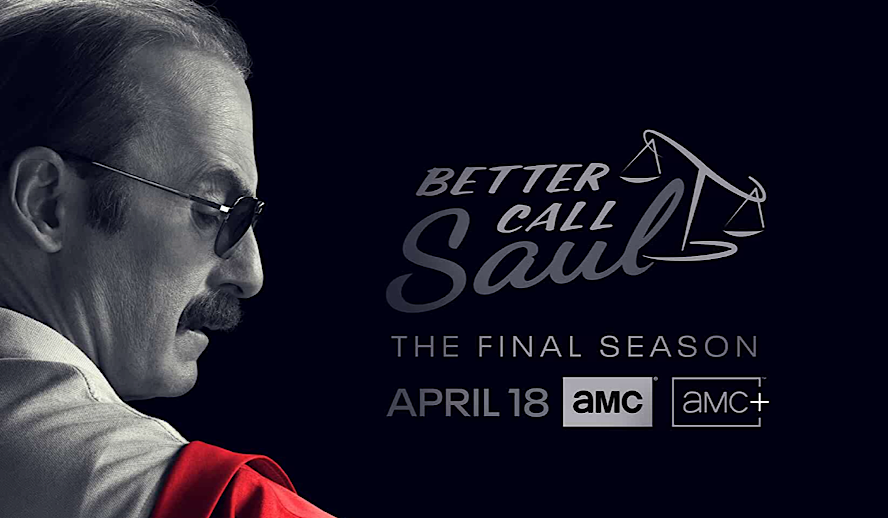Table of Contents

Photo: ‘Better Call Saul’
The Evil that Men Do
“No matter what they do with you now, no matter where they put you or for how long, it will never be enough,” Marie Schrader (Betsy Brandt) bitterly tells Jimmy. Both of the shows created by Vince Gilligan, ‘Breaking Bad’ and ‘Better Call Saul,’ deal with the irrevocable consequences of the actions of powerful men. Since a lot of what ‘Better Call Saul’ is interested in is the consequences of actions, and the irreversible hurt and damage they do, it is fitting that this last episode delves into this further than ever. The question is raised by the finale, called ‘Saul Gone,’ not just of what the consequences of Jimmy’s actions are, but also of whether or not redemption is wanted or even possible. Incredibly, it matches the ‘Breaking Bad’ finale in gravity and outstrips it in profundity, managing not only to answer many of the questions raised by the show, but to ask a few more too.
Related article: The Hollywood Insider’s CEO Pritan Ambroase: “The Importance of Venice Film Festival as the Protector of Cinema”
Related article: The Masters of Cinema Archives: The Hollywood Insider Pays Tribute to ‘La Vie En Rose’, Exclusive Interview with Director Olivier Dahan
Related article: – Want GUARANTEED SUCCESS? Remove these ten words from your vocabulary| Transform your life INSTANTLY
The Time Machine
In this final episode of ‘Better Call Saul,’ and indeed of the ‘Breaking Bad’ universe as a whole, everything is metaphor or synecdoche. Opening in the desert, we see Jimmy (Bob Odenkirk) drinking hurriedly, which prompts Mike (Jonathan Banks) to tell him to go slow or he’ll make himself sick. We begin, thus, with a richly symbolic vignette of Mike’s role within the landscape of evil and error that Gilligan and Gould have built over the last fourteen years. Always telling Nacho (Michael Mando), then Jimmy, then Saul, to take things no further, to be satisfied with what they have, to find a way out, to resist greed. “We had a good thing,” he famously rued in the moments before his death by Walt (Bryan Cranston), “you just had to blow it up – you, and your pride and your ego, you just had to be the man.” After moving away from the water, Jimmy suggests taking the seven million dollars they have on them, but Mike, of course, says no.
This rich and compelling use of metaphor to characterize will continue, next with what is the central metaphor of the finale of the episode, the time machine. Two times Jimmy will ask where someone would go and what they would do if they had a time machine, and yet, like Peter the Apostle, three times Jimmy will be challenged with this question himself before the rooster crows. A large part of the tension of the episode will ride on how he will answer.
First, Jimmy directs the question toward Mike, somewhere in the desert near the end of season five. “December 8, 2001” is the reply. He corrects himself: “March 17, 1984. Day I took my first bribe.” Mike tries to stop people’s descent toward evil precisely because he wishes he could turn the clock back himself and halt his own moral decline. When Jimmy offers his answer, it’s very much in character as ‘Saul,’ though. “It’s easy,” he begins, “May 10, 1965, that’s the day Warren Buffet took over at Berkshire Hathaway. I figure, got a million left from building the time machine, so I take my half and I just stick it into Berkshire, and then I come back here and I’m a billionaire.” We’re not completely convinced, and neither is Mike. Nevertheless, the pair stand up and get walking. Towering above them, a weathervane spins. As the wind blows, time marches on, heedless of human concern. Jimmy doesn’t have a time machine, and he can’t fix the mistakes he has so clearly made and so clearly cares about. What, we repeatedly wonder, can Jimmy do?
Related video: Come Behind The Scenes of ‘Elvis’ | Austin Butler, Tom Hanks and Baz Luhrmann
Next in this series of Dickensian visits from ghosts of scams past is Walt, directly after the events of ‘Ozymandias,’ the penultimate episode of ‘Breaking Bad.’ The logic in this directorial decision is easy to unpack. In spite of almost all of the events of ‘Better Call Saul,’ Jimmy just wants money. Even in the most charitable interpretation, Jimmy is so deeply buried within Saul, the protective shell he’s formed around the vulnerable Jimmy McGill, that he cannot admit to himself, let alone anyone else, that he has real, human, painful regrets. An obvious question, therefore, arises: after all the events of ‘Breaking Bad,’ will his stance have changed? Unfortunately, it seems, he still hasn’t learned. Tragically, however, he is still asking the same question. Jimmy is quietly obsessed with the life he could have led, of the ways he could have done things differently. He must imagine, through others, how the world might be different, since he doesn’t have the strength himself to suspect acting in another way might have been possible. Jimmy convinces himself of the inevitability of his fate while consoling himself with hypotheticals. As with Mike, Walt’s answer reveals something central to his nature. At first, he brushes Jimmy’s thought experiment off as a “meaningless question” concerning a “scientific impossibility.”
‘Better Call Saul’
As always, Walt finds any opportunity to massage his own ego and exert his belief in his own superior intelligence over others. He unpacks the question, telling Jimmy, “You are talking about regret, so if you want to talk about regrets, just ask about regrets, and leave all this time traveling nonsense out of it.” Not only does this neatly demonstrate Walt’s arrogance, but also his pathetic unwillingness to confront reality. Instead of just answering what was an easily comprehensible hypothetical, he obfuscates and diverts in order to avoid conceding that he’s made mistakes. Still, when Jimmy rephrases, we get an answer, albeit a flawed one. Walt grumbles about how he was short-changed by Elliot (Adam Godley) and Gretchen (Jessica Hecht), his former business partners, and wishes he had not left their company. Some might think that there was not much more that audiences could learn about Walter White, but this snapshot of Walt is the perfect antidote to all the misinterpretations which abounded of ‘Breaking Bad.’ Walt was delusional, egotistical, and bitter. When the question is turned to Jimmy, we are supplied with another unsatisfying response. His biggest regret, Jimmy says, is messing up what he called a ‘slip and fall’ at an early age. He apparently orchestrated a slip on ice in order to sue a company, but accidentally hurt his knee in the process. This answer is quite obviously the product of his façade, which the final season and chiefly this final episode will see finally slip.
Related article: MUST WATCH – The Hollywood Insider’s CEO Pritan Ambroase’s Love Letter to Black Lives Matter – VIDEO
Lastly, we see a flashback to near the beginning of the show, where Jimmy is dropping groceries round at Chuck’s house. After offering him to stay and chat, Chuck (Michael McKean) tells Jimmy he can always change his path if he doesn’t like the current direction he’s heading in. Jimmy is unhappy with this, responding, “When have you ever changed your path?” to which Chuck does not reply. We then see Chuck pick up HG Wells’ ‘The Time Machine’ from the counter. This hint seems symbolic of two things: firstly, the fact that Chuck, of course, does have his own regrets, and likely would have changed certain things if he could. Secondly, this little detail suggests that this may well be the time Jimmy would go back to if he could. The tragedy here lies in seeing that even before the events of ‘Better Call Saul,’ before anything had really gotten that serious, Jimmy felt he was already committed to the path he was on. At every flashback point in the episode, he believes that he is too far down the line to change anything, refusing to admit to himself the things he cares about.
The characters of Vince Gilligan’s world tell themselves they cannot stop, not because it’s true but because they do not want to stop. One is reminded of Walt’s famous line: “Do you know what would happen if I suddenly decided to stop going into work?” This is no excuse, the finale seems to say. Jimmy had many opportunities to stop what he was doing, and he never did, though this wasn’t always his fault. One can’t help remembering the times he’s been honest and was shut down, like when he told Chuck, “If I had to do it all over again, I would maybe do some things differently,” saying outright that “I have regrets.” “What’s the point of all the sad faces and the gnashing of teeth, if you’re not going to change your behavior? And you won’t,” Chuck responds, brutally. “I can change,” Jimmy whimpers before being shut down, savagely, by Chuck’s most awful rebuke of all: “You’ve never mattered all that much to me.” Chuck’s profound impact on Jimmy lives on in ‘Saul Gone’ in the form of the hum of an ‘exit’ sign, a bitterly ironic reminder of the fact that Chuck never really exited Jimmy’s life; he still hums pangs of guilt in the back of his mind. Jimmy’s last chance to redeem himself will come at the end of this episode.
Things to do:
- Subscribe to The Hollywood Insider’s YouTube Channel, by clicking here.
- Limited Time Offer – FREE Subscription to The Hollywood Insider
- Click here to read more on The Hollywood Insider’s vision, values and mission statement here – Media has the responsibility to better our world – The Hollywood Insider fully focuses on substance and meaningful entertainment, against gossip and scandal, by combining entertainment, education, and philanthropy.
A Death Blow to the Glamour of Evil
From the start, it’s clear that it’s going to be hard for Jimmy to end the show with his dignity. After being cornered by the police, he is found hiding in a dumpster, scrabbling for diamonds he’s just dropped. “This is how they get you?” he repeats to himself, pacing around his cell, “What were you thinking?” The charming, skillfully devious sheen on much of Saul’s activities throughout the show is swiftly shed with this scene of desperation. Despite what he tries to convey, he does not have a handle on everything.
Nevertheless, trying to regain his dignity, he calls Bill Oakley (Peter Diseth), who he somehow convinces to represent him for free. When a pessimistic Oakley asks, “How do you see this ending?”, we get a determined response, “With me on top, like always,” but it doesn’t feel as convincing as it used to. In plea negotiation, he invites Marie Schrader into the room, to whom he addresses one of the best monologues of the entire show, and yet only the second best in this episode. In this speech, he tells Marie and the prosecutor what he would tell jurors, explaining how he was forced to do what he did under fear of death from Walt. Nobody is convinced, but as Jimmy points out, he only needs to convince one juror – this seems to work. With his confidence coming back quickly, we now see Jimmy leaning back in his chair, dictating his demands like a prince: the years, the exact wing of the exact prison he wants, and the brand of ice cream he’d like to be supplied with. They accept, reluctantly, but Jimmy won’t stop there, instead bringing up, somewhat smugly, that he can tell them about Howard’s death. He is swiftly informed that Kim (Rhea Seehorn) has already told them everything, and with that, he is devastated and once again stripped of honor and dignity. This constitutes just one of the many twists of fate which occur in this episode, where Saul’s fate seems constantly to hang in the balance.
Related video: EVOLUTION: Every Tom Cruise Role From 1981 to 2021, All Performances Exceptionally Poignant
Related article: A Tribute to Johnny Depp: The Actor and Musician Who Defined Range
Related video: EVOLUTION: Every Johnny Depp Role From 1984 to 2020, All Performances Exceptionally Poignant
Related article: A Tribute to the Hero & President Volodymyr Zelenskyy: Comedian/Actor, Ukraine’s President and Heroic Leader
The occasional glamour of Jimmy’s crimes was an inevitably fragile thing bound to falter in time. The light-hearted allure of his activities was false, covering over a dark, sordid core. Indeed, the most glamorous, memorable, and spectacular scenes of Jimmy’s chicanery are seen in his tricks on Howard and Chuck. The elaborate schemes Jimmy employs to harm these two people begin seeming fun and ingenious, but end with tragic deaths. The few moments where Jimmy’s, or rather Saul’s work appears glamorous, end in traumatic disaster. Chuck’s passing will haunt Jimmy permanently, and Howard’s will get to Kim so much that she risks everything to confess. Much like how in ‘Ozymandias,’ Walt experiences many emasculations, in ‘Saul Gone,’ Jimmy is humbled time and time again. One particularly pathetic moment occurs when we hear him whisper “It’s show time” when entering the court. What used to seem quirky now becomes tragic, as the phrase doesn’t carry the same cheekiness when Jimmy is the defendant, not just the lawyer.
In ‘Better Call Saul,’ evil is shown for what it is: squirming, weak, dirty, and tragic. Gilligan is careful to utterly dismantle any sense of glorification of Jimmy and Walt’s actions. The show executes this perfectly, finding unique ways to show Jimmy in a fresh light; not as a slick and competent conman, but as a terrified man in deep.
Saul’s Fate
Though it would be impossible to explain what becomes of Saul without spoiling the show’s ending, one can comment on how brilliantly it was executed. In one of the best television monologues ever: part-brag, part-confession, Saul seals his fate, and indirectly answers the time machine thought experiment he’s been preoccupied with for years. Odenkirk’s delivery here is flawless, leaving listeners hungry for each and every next word, always uncertain what it will be. This scene represents one of the tensest and most satisfying in the entire franchise’s duration. There are more than a few similarities to the finale of ‘Breaking Bad,’ too, with Saul and Walt both changing the stories they’d always been telling in comparable ways. What is markedly different between the two endings, however, is that Walt dies still an inhuman villain, only marginally redeemed, while ‘Better Call Saul’ will depict Jimmy as far more human than Walter White.
Related article: EVOLUTION: Every Henry Cavill Role From 2001 to 2021, All Performances Exceptionally Poignant
Related article: EVOLUTION: Every Chris Evans Role From 1997 to 2020, All Performances Exceptionally Poignant
Related article: #metoo Revolution: Powerful Questions That Need Answers
Related article: FACT-CHECKED Series: Timothee Chalamet and 32 Facts about The Young Superstar
Moreover, while ‘Ozymandias’ and ‘Felina’ see Walter White die still overcome by who he became as Heisenberg, with Walter White a distant memory, ‘Saul Gone’ is different. ‘Better Call Saul’ portrays its protagonist as finally finding a balance between his various faces. In a perfectly fashioned ending, Gene, Jimmy, and Saul will form a whole and coexist for the first time: colour and monochrome, honesty and dishonesty, misery and contentment. Jimmy McGill will make a sacrifice and thus regain himself. The show’s closing shots perfectly embody this, both the consequences of Jimmy’s actions and the price he’s paid to try and make up for them.
In the end, this is in neat accordance with the purpose of each show. ‘Breaking Bad’ is about one man suppressing the good in himself and embracing the bad, but ‘Better Call Saul’ concerns the process of a man fragmenting and then reconciling all the aspects of who they are, and the consequences that ensue from the intervening imbalances. Saul was a shell against reality for Jimmy, and by inhabiting this façade too deeply, tremendous harm was done. Unlike the blaze of glory which Walter goes out with, ‘Better Call Saul’ has a more reserved ending, where glory is given up in favor of the mundane. As with the classic Shakespearean ending, Jimmy ascends morally, but falls physically, finally willing to make that age-old exchange between morality and wealth. Yes, Saul is gone, much like Walt, but unlike his ex-employer, Saul is not lost.
The challenge of any television finale is to sum up all that the show was about while taking one last step forward in a way that feels final. Success comes in doing all this without it being obvious. One needs to tie up loose ends without anybody noticing the knots. ‘Better Call Saul’ succeeds in going far beyond this, weaving a tapestry of profound and complex decisions and consequences that all feel both utterly inevitable and entirely out of the blue.
By Samuel Sandor
Click here to read The Hollywood Insider’s CEO Pritan Ambroase’s love letter to Cinema, TV and Media. An excerpt from the love letter: The Hollywood Insider’s CEO/editor-in-chief Pritan Ambroase affirms, “We have the space and time for all your stories, no matter who/what/where you are. Media/Cinema/TV have a responsibility to better the world and The Hollywood Insider will continue to do so. Talent, diversity and authenticity matter in Cinema/TV, media and storytelling. In fact, I reckon that we should announce “talent-diversity-authenticity-storytelling-Cinema-Oscars-Academy-Awards” as synonyms of each other. We show respect to talent and stories regardless of their skin color, race, gender, sexuality, religion, nationality, etc., thus allowing authenticity into this system just by something as simple as accepting and showing respect to the human species’ factual diversity. We become greater just by respecting and appreciating talent in all its shapes, sizes, and forms. Award winners, which includes nominees, must be chosen on the greatness of their talent ALONE.
I am sure I am speaking for a multitude of Cinema lovers all over the world when I speak of the following sentiments that this medium of art has blessed me with. Cinema taught me about our world, at times in English and at times through the beautiful one-inch bar of subtitles. I learned from the stories in the global movies that we are all alike across all borders. Remember that one of the best symbols of many great civilizations and their prosperity has been the art they have left behind. This art can be in the form of paintings, sculptures, architecture, writings, inventions, etc. For our modern society, Cinema happens to be one of them. Cinema is more than just a form of entertainment, it is an integral part of society. I love the world uniting, be it for Cinema, TV, media, art, fashion, sport, etc. Please keep this going full speed.”
More Interesting Stories From The Hollywood Insider
– Want GUARANTEED SUCCESS? Remove these ten words from your vocabulary| Transform your life INSTANTLY
– A Tribute to Martin Scorsese: A Complete Analysis of the Life and Career of the Man Who Lives and Breathes Cinema
– Do you know the hidden messages in ‘Call Me By Your Name’? Find out behind the scenes facts in the full commentary and In-depth analysis of the cinematic masterpiece
– A Tribute To The Academy Awards: All Best Actor/Actress Speeches From The Beginning Of Oscars 1929-2019 | From Rami Malek, Leonardo DiCaprio To Denzel Washington, Halle Berry & Beyond | From Olivia Colman, Meryl Streep To Bette Davis & Beyond
– In the 32nd Year Of His Career, Keanu Reeves’ Face Continues To Reign After Launching Movies Earning Over $4.3 Billion In Total – “John Wick”, “Toy Story 4”, “Matrix”, And Many More
better call saul, better call saul, better call saul, better call saul, better call saul, better call saul, better call saul, better call saul, better call saul, better call saul, better call saul, better call saul, better call saul, better call saul, better call saul, better call saul, better call saul, better call saul, better call saul, better call saul, better call saul

Outside of his ongoing MA degree in English and Philosophy at St Andrews, Samuel Sandor spends his spare hours writing – short stories, essays, articles on film, music, or any other subject he finds himself preoccupied by. Through all these strands, he strives to find a unique and unexpected way to look at the subject at hand. Without a concerted effort, it’s easy to form surface-level impressions of both the art and the news that one consumes. Sam’s pieces attempt to answer this interpretative simplicity by inducing curiosity in subjects one might ordinarily devote little thought to. It is this desire to transform viewpoints with novel ideas and to stoke deeper and more extensive conversations which attracted him to The Hollywood Insider.








